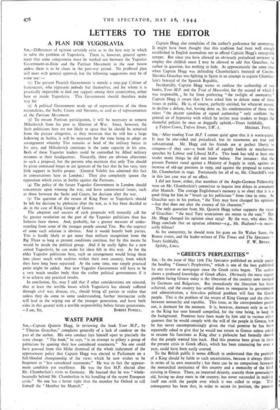A PLAN FOR YUGOSLAVIA
LETTERS TO THE EDITOR
Sia,—Differences of opinion certainly exist as to the best way in which to solve the problem of Yugoslavia. There is, however, general agree- ment that some compromise must be worked out between the Yugoslav Government-in-Exile and the Partisan Movement in the near future unless there is to be chaos in the post-war period.. No proffered plan will meet with general approval, but the following suggestions may be of some use : - (1) The present Pourich Government is merely a stop-gap Cabinet of bureaucrats, who represent nobody but themselves, and for whom it is practically impossible to find any support among their countrymen, either here or inside Yugoslavia. This Government should therefore make way for (2) A political Government made up of representatives of the three nationalities, the Serbs, Croats and Slovenes, as well as of representatives of the Partisan Movement.
(3) To ensure Partisan participation, it will be necessary to remove Mihailovich from his post as Minister of War. Since, however, the Serb politicians here are not likely to agree that he should be removed from the picture altogether, as they maintain that he still has a large following in Serbia, it will be necessary for the time being to adopt an arrangement whereby Tito remains as head of the military forces in his area, and Mihailovich continues in the same capacity in his area. Both of these Yugoslav leaders could be controlled by Allied military missions at their headquarters. Naturally, there are obvious objections' to such a proposal, but the persons who maintain that only Tito should be given command forget or are ignorant of the fact that he has very, very little support in Serbia proper. (General Velebit has admitted this fact in conversations here in London.) They also completely ignore the opposition which exists in Serbia against the Partisans.
(4) The policy of the future Yugoslav Government in London should concentrate upon winning the war, and leave controversial issues, such as those between the Serbs and Croats, for decision after the war.
(5) The question of the return of King Peter to Yugoslavia should be left for decision by plebiscite after the war, as it has been decided to do in the case of King George of Greece.
The adoption and success of such proposals will naturally call for fat greater resolution on the part of the Yugoslav politicians than has hitherto been shown. And, probably, for a greater measure of under- standing from some of the younger people around Tito. But the urgency of some such solution is obvious. And it would benefit both parties. Tito is hardly likely to get more than military recognition from the Big Three as long as present conditions continue, but by this means he would be inside the political group. And if he really fights for a new united Yugoslavia, he can make his ideas felt in this way. As for the older Yugoslav politicians here, such an arrangement would bring them into closer touch with realities within their own country, from which they have long been separated. At the same time, one simple practical point might be added. Any new Yugoslav Government will have to be a very much smaller body than the earlier political governments if it is to achieve any practical results.
In conclusion, Sir, may I add that if other considerations are rejected, that at least the terrible losses which Yugoslavia has already suffered through civil war, disease, etc., should bring all parties to realise that unless they do come to some understanding, further internecine strife will lead to the wiping out of the younger generation, and leave both sides in this quarrel with a terrible responsibility before future generations.


























 Previous page
Previous page